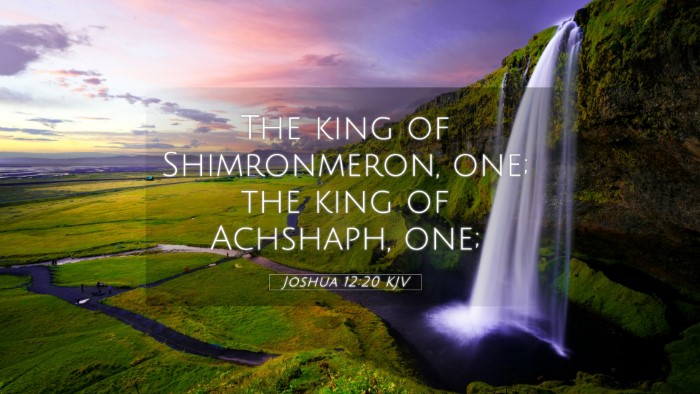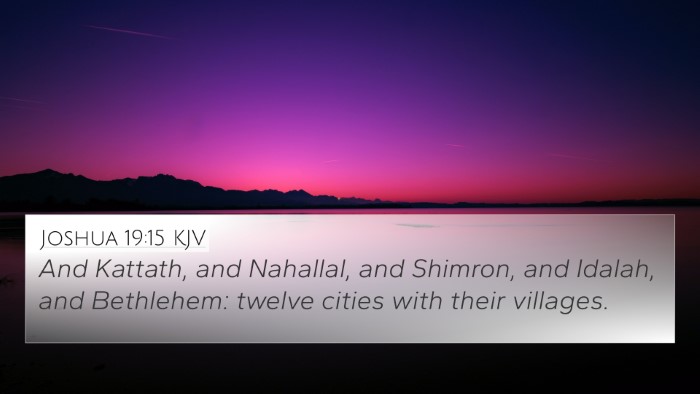Understanding Joshua 12:20
Verse Reference: Joshua 12:20
"The king of the city of Hormah, one; the king of Arad, one."
Summary and Insights
Joshua 12:20 highlights the victories of the Israelites over specific Canaanite kings as they came into the Promised Land. This verse is part of a larger narrative in which the conquests of various kings are listed, emphasizing God's faithfulness in fulfilling His promises to Israel. The mention of these kings signifies not only a historical record but serves as a theological reflection on divine providence and vindication.
Thematic Insights
- Divine Sovereignty: The victories attributed to the leadership of Joshua and the Israelites illustrate God's authority over nations.
- Fulfillment of Promises: The defeat of the kings underscores God's promise to give the land to Israel.
- Historical Record: This verse is part of Israel's history, providing a basis for understanding their future claims to the land.
Commentary Perspectives
Matthew Henry's Commentary
Henry notes that the listing of conquered kings serves as a testament to God's might and the valor of Israel's leaders. He emphasizes that such records facilitate a reflective understanding of God’s role in the history of Israel.
Albert Barnes' Notes
Barnes focuses on the significance of each king mentioned as representing not just geographical territories but spiritual battles that reflect the ongoing struggle between good and evil. The victories symbolize triumphs that resonate beyond the text, suggesting deeper moral and ethical implications.
Adam Clarke's Commentary
Clarke elaborates on the direct implications of these conquests, linking them to the larger Biblical narrative of God's chosen people reclaiming their inheritance. He cautions readers about the importance of maintaining faith against adversities, as these victories were achieved through reliance on divine strength.
Bible Cross-References
This verse has several connections with other Biblical texts. Here are some cross-references that highlight similar themes or events:
- Deuteronomy 3:2: God gives victory over King Og of Bashan, emphasizing God’s power.
- Joshua 10:1-27: The conquest of five kings, showcasing God’s miraculous intervention.
- Numbers 21:3: Israel dedicates cities after victories, aligning with the narrative of conquest.
- Joshua 11:10-11: Destruction of the cities of the Canaanites highlights God's judgment.
- 1 Samuel 15:18: God commands Israel to destroy their enemies, linking to the theme of holiness in warfare.
- Psalms 44:3: A reflection on God's victories for Israel, reinforcing dependence on the Divine.
- Romans 8:37: New Testament insight into spiritual conquest through Christ, aligning with themes of victory.
Connections Between Bible Verses
The connections between Joshua 12:20 and the verses listed above demonstrate a prevalent theme of divine aid in the face of opposition. These instances reflect the understanding that God empowers His people to overcome challenges and secure their promised inheritance.
Tools for Bible Cross-Referencing
For those interested in deeper Bible study, there are various tools and resources available for effective cross-referencing:
- Bible Concordance for locating related verses.
- Cross-Reference Bible Study guides that suggest connections.
- Utilizing Bible Reference Resources for researching themes.
- Digital tools like Bible apps that can help highlight interrelated scriptures.
Exploring Biblical Themes
Engaging with Joshua 12:20 through comparative analysis not only enhances understanding but also invites theological reflection on God’s relationship with humanity, as narrated throughout the scripture. This passage encourages the believer to reflect on the assuredness of God’s promises and the need for faithfulness amidst life's battles.
Conclusion
Joshua 12:20 provides a powerful reminder of God's sovereignty and faithfulness in leading His people to victory. Through the insights derived from public domain commentaries and scriptural cross-referencing, readers can appreciate the rich tapestry of God's Word, which continually inspires and guides believers in their spiritual journeys.





